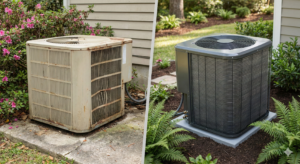Summers in Summerville are hot and sticky, and having a dependable air conditioner isn’t a luxury—it’s a must. When the heat really settles in, your AC gets a heavy workout trying to keep your home cool and comfortable. But if something goes wrong inside the unit, especially with the compressor, you might find yourself sweating it out indoors. The compressor acts like the heart of your AC, moving refrigerant through the system so warm air gets removed and replaced with cool air.
If the compressor isn’t working properly, your system starts to struggle. You may still hear it running, but the air might not feel any cooler. Many people don’t even realize their AC’s compressor is failing until the system stops altogether or the house never reaches the right temperature. Catching the signs early can help prevent bigger damage and save you from being surprised by a full breakdown right in the middle of a hot Summerville day.
Common Signs Of Compressor Problems
The compressor plays a big role in making your AC do what it’s supposed to—cool the air and keep your home comfortable. When it starts to run into trouble, there are often a few early warning signs. Knowing how to pick up on them can give you time to get the issue checked out before it turns into something bigger and more expensive.
Here are some of the most common signs that could mean your compressor is struggling:
– Strange noises from the outdoor unit: If you hear grinding, clicking, or buzzing, that’s not normal. The compressor motor could be wearing out or hitting internal issues.
– Warm air coming from the vents: If the fan is running but the air doesn’t feel cold, your compressor might not be circulating the refrigerant like it should.
– Tripped circuit breakers: Electrical overloads caused by compressor problems can lead to frequent breaker issues.
– Unit turns on but doesn’t cool: When the outside unit seems to be running but your home never cools down, the compressor might be the issue.
– AC shuts down randomly: Short-cycling or automatic shutdowns might signal a compressor trying to protect itself from more damage.
Let’s say you’ve been running your AC all afternoon and it still feels warm inside, even though your thermostat is set low. You check the unit and notice it’s making an odd humming noise, but the airflow feels weak and not very cold. That combo often points to a compressor that’s not doing its job properly.
Some of these symptoms could also be caused by low refrigerant levels or airflow restrictions. But if multiple signs show up at once, it’s safe to say that something’s likely wrong with the compressor, and it’s time for a professional to take a look.
Causes Of Compressor Problems
Compressor trouble doesn’t usually happen out of nowhere. It builds over time, and there are a few common factors that cause it to wear out or break down. Understanding those causes can help you avoid them and extend the life of your AC.
Here are some of the typical reasons compressors fail:
1. Lack of maintenance: When your system isn’t cleaned or checked regularly, dust, grime, and old filters can put extra strain on the entire unit. That stress adds up, and compressive parts wear down faster.
2. Refrigerant leaks: Too much or too little refrigerant can mess with the pressure levels in the system. That imbalance forces the compressor to work outside its normal range and increases the chance of failure.
3. Overheating: Dirt buildup, blocked airflow, or running the AC in high outdoor temps for long periods can all overheat the compressor. High heat can wreck internal parts or cause the motor to shut off.
4. Electrical issues: Wiring problems, loose connections, or faulty capacitors can create voltage spikes that damage the compressor or keep it from turning on.
5. Age: Even if you take good care of your AC, the compressor won’t last forever. Most eventually wear down after years of heavy use.
One way to help avoid these problems is by scheduling seasonal AC check-ups. That lets a technician spot early warning signs before they get worse. Keeping your filters clean, using your thermostat wisely, and being aware of how your system sounds and feels all go a long way in keeping your compressor and your cool working right through the Summerville heat.
Diagnosing Compressor Issues
When your AC is on the fritz, it might seem like a good idea to try and fix the problem yourself. But diagnosing compressor issues can be tricky and is best left to the pros. HVAC technicians have the expertise and tools to properly assess the situation without causing further damage. They typically follow a series of steps to pinpoint the problem.
1. Visual Inspection: Techs start by visually checking the AC unit for any obvious signs of damage or wear.
2. Testing Electrical Components: They use multimeters to check for any electrical issues, ensuring the compressor is receiving the correct voltage.
3. Pressure Testing: Using gauges, they measure the pressure levels within the system to see if there are refrigerant imbalances affecting the compressor.
4. Listen and Observe: They listen for unusual noises and observe how the unit is running to detect any mechanical issues.
5. System Performance Check: Finally, they assess overall system performance and cross-check findings to narrow down the source of the problem.
Professional diagnosis isn’t just about identifying issues. It’s about doing so safely and preventing unnecessary costs. Letting the experts handle it can save you time and stress, ensuring your AC is back up and running smoothly.
When to Consider Compressor Replacement
Faced with a faulty compressor, you might wonder if it’s better to repair or replace it altogether. In some cases, replacing the compressor can be the smarter choice. If your AC is relatively new and under warranty, a repair might be covered, making it worth considering. However, if your system is older or has frequent problems, replacement might be more cost-effective in the long run.
Here are scenarios where replacing the compressor makes sense:
– The unit is over 10 to 15 years old and nearing the end of its life
– Repairs cost over half as much as a new compressor would
– Utility bills are rising due to an inefficient system
– Frequent breakdowns have been a pattern, indicating deeper issues
A new compressor can improve energy efficiency, reducing your electricity costs while delivering more reliable cooling. Plus, newer models often come with better features and warranties, giving you peace of mind for years to come.
Keeping Your AC Healthy in Summerville
To get the most out of your AC and keep the compressor in top shape, regular maintenance is key. Simple routines can make a big difference in preventing problems before they start.
– Schedule yearly tune-ups: An annual check-up by a technician can spot issues early and ensure everything runs efficiently
– Change filters regularly: Dirty filters force the system to work harder, risking damages to the compressor. Swap them out every 1 to 3 months
– Keep outdoor units clean: Clear debris and leaves from around the unit to make sure airflow isn’t restricted
– Check for refrigerant leaks: Unusual cooling or hissing noises? Get these checked to avoid strain on the compressor
Following these steps can add years to your AC’s life and maintain a cool, comfortable home in Summerville. Investing a little time now can save a lot of trouble later, helping you stay cool when it matters most.
If your AC is showing signs of trouble, don’t wait until it’s too late. Make sure your home stays cool and comfortable by exploring our comprehensive services for air conditioning in Summerville. The experts at Coastal Carolina Comfort are ready to keep your system running smoothly, providing peace of mind during the hottest months. Reach out to us today for more information on how we can assist you.


